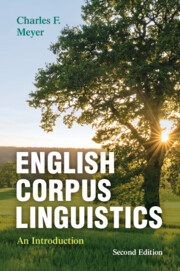Book contents
- English Corpus Linguistics
- English Corpus Linguistics
- Copyright page
- Contents
- Figures
- Tables
- Preface
- Acknowledgments
- 1 The Empirical Study of Language
- 2 Planning the Construction of a Corpus
- 3 Building and Annotating a Corpus
- 4 Analyzing a Corpus
- Concluding Remarks
- Discussion Topics
- Appendix: Corpora
- Bibliography
- Index
1 - The Empirical Study of Language
Published online by Cambridge University Press: 15 June 2023
- English Corpus Linguistics
- English Corpus Linguistics
- Copyright page
- Contents
- Figures
- Tables
- Preface
- Acknowledgments
- 1 The Empirical Study of Language
- 2 Planning the Construction of a Corpus
- 3 Building and Annotating a Corpus
- 4 Analyzing a Corpus
- Concluding Remarks
- Discussion Topics
- Appendix: Corpora
- Bibliography
- Index
Summary
This chapter focuses on the empirical basis of corpus linguistics, describing how linguistic corpora have played an important role in providing corpus linguists with linguistic evidence to support particular analyses of language. It opens with a discussion of how to define a corpus, and then traces the history of corpus linguistics, noting that as early as the fifteenth century, concordances were created based on the Bible. Later developments included the creation of the Quirk Corpus (print samples of spoken and written English) in 1955 at the Survey of English Usage in University College London, followed (in the 1960s) by the Brown Corpus (edited written American English). There are now online corpora, such as the Corpus of Contemporary American English. Tools for creating and analyzing corpora have also improved considerably: tagging corpora with part-of-speech information can be done with high levels of accuracy. The chapter closes with a description of the many different areas (e.g. lexicology and sociolinguistics) that have benefited from the use of linguistic corpora as well as a sample linguistic analysis demonstrating that corpus-based methodology and the theory of construction grammar can provide evidence that appositives in English are a type of construction.
Keywords
- Type
- Chapter
- Information
- English Corpus LinguisticsAn Introduction, pp. 1 - 41Publisher: Cambridge University PressPrint publication year: 2023



